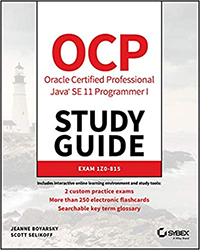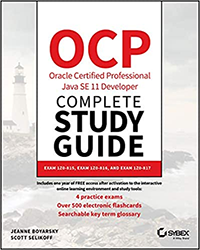
Update (11/05/2020): Read The 1Z0-819 Exam page to learn how you can easily our Java 11 Study Guides to prepare for Oracle’s 1Z0-819 Exam, as well as the 1Z0-817 Upgrade Exam.
In Part 1 of my experience taking the 1Z0-819 exam, I described my overall experience taking the new Java 11 Oracle Certified Professional exam. In Part 2, I’ll go into more detail about some of the finer points for those planning to take this new exam using our Programmer I or Programmer II books, or the combined Complete Study Guide.
TLDR: Yes, our Java 11 books are perfect for the new 1Z0-819 exam! I scored an 87% myself, although I was focused more on studying the exam than passing it. Read on if you plan to take the new 1Z0-819 exam!
1. Differences in Material between the Old and New Exams
By comparing the 1Z0-815/1Z0-816 and 1Z0-819 exam objectives, you might be inclined to think the material is radically different, but really isn’t. For most of the objectives, Oracle just took 2-3 objectives and rewrote the sentences to form a single objective. This is from someone who spent hours studying every word of all sets of objectives! See, not so scary is it?
That said, there are some differences between the 1Z0-815/1Z0-816 exams and the 1Z0-819 exam that you should be familiar with. Jeanne and I will be posting an addendum page on this blog for the people who purchase our Java 11 books to ensure they are properly prepared. For now, though, these are the important differences:
- Assertions are gone! This is just since most Java developers tend to use JUnit rather than the built-in
assertkeyword. When you get to this section in our books, feel free to skip it and have a snack! CallableStatementare also gone! Jeanne and I were never thrilled this was on the exam as the usage can dependent very much on the database. You can skip this section too and have a drink with your snack!- Oracle added the word privileged to the security objective and this results in the
doPrivileged()method now being in scope. For these questions, you need to read Section 9 of the Oracle Secure Coding Guidelines for Java SE. Some people reported seeingdoPrivileged()on the 1Z0-816 exam, though, so it’s possible Oracle updated the 1Z0-816 exam more recently with this topic.
2. Studying for the 1Z0-819 Exam using our Books
Since the changes between the old and new exams are minimal, we still strongly recommend our Java 11 books to study for the new 1Z0-819. Since we were part of the team that helped design the objectives for the new 1Z0-819 exam, we were careful to keep the amount of new material to an absolute minimum. After taking the new exam, we are confident they can be used to successfully prepare for an pass the 1Z0-819 exam.
Now you may be asking, which of our books should you use? We recommend one of the following two options:
- Option 1: Java 11 Programmer I Study Guide and Java 11 Programmer II Study Guide
- Option 2: Java 11 Complete Study Guide
Before you rush to buy the Java 11 Complete Study Guide (since it’s one book instead of two), be aware that the physical edition is 1200+ pages long! And, the other two books contain the same material. In other words, if you plan to carry the book around on a train or bus, I recommend buying the first two books over the Complete Study Guide. Although if you’re going with the eBook edition, then go with whatever is cheaper!
3. Coming Soon: 1Z0-819 Practice Test Book
Jeanne and I recently finished the manuscript for our new Java 11 Practice Test book. This book has been updated and custom fit for the new 1Z0-819 exam. It is scheduled be released at the end of the year or early 2021.
4. Missing Strikethrough Exam Software Feature
On previous exams, you could right-click on an answer choice and it would cause it to strikethrough. This was extremely helpful for process of elimination and especially now that some questions have up to 10 answer questions! Unfortunately, this feature was not available when we took the exam. It’s not clear if this was a bug or Oracle has since pulled the feature, but I hope they bring it back. I had to actually write ABCDEFGHIJ on my scratch pad for some questions and cross them out one by one! Especially difficult when you can’t erase on the whiteboard they give you.
5. 1Z0-819 Exam vs 1Z0-817 Upgrade Exam: Scott’s Recommendation
If you hold a previous Oracle Certified Professional (not Associate) title, then you can still take the Java 11 1Z0-817 Upgrade Exam rather than the Java 11 1Z0-819 Exam. At this time, Oracle does not have any plans to retire the Upgrade exam.
My recommendation is given the choice between the two exams, I’d rather take the 1Z0-817 Upgrade exam. First off, the material is narrower in scope. Very few of the topics from from the previous 1Z0-815 exam appear and many of the topics from the 1Z0-816 exam (annotations, JDBC, security) are gone as well. In other words, you only have to study a dozen chapters from our Programmer II book, along with the Upgrade Appendix we included in the book, rather than potentially all of the chapters in the Complete Study Guide.
While the 1Z0-817 upgrade exam has more questions than the 1Z0-819 exam, you have 3 hours. Since I found the questions on the 1Z0-817 exam to be often shorter with fewer answer choices than the questions on the 1Z0-819, I feel you have a lot more time to think on the upgrade exam. I was not remotely worried about running out of time when I took the 1Z0-817 upgrade exam.
The only downside to taking the 1Z0-817 upgrade exam is that it contains a lot of questions on modules. In fact, 3 out of 10 of the objective sets are modules on the 1Z0-817 exam! It is fair to say modules did not feature nearly as prominently on the 1Z0-819 exam, so if you don’t like modules than the 1Z0-819 might be a better fit for you.
6. Exam Center Process
I opted to take the exam in-person after hearing some scary stories about at-home software tracking your eye movement and what not. Below are my comments from taking it in the time of COVID:
- Temperature check and handwash station as soon as I walked in the door. The testing center I was at had a thermometer mounted to the wall I had to stand in front of.
- Had to keep my mask on the entire time, except when I was signing in and they wanted to check my ID and take my picture.
- To my surprise, there were 3 other people taking tests too, we were placed on opposite corners of the room.
- I received my score as soon as I clicked “Finish” to end the exam. It was shown on the screen.
- The test center handed me “Score Report” which had nothing on it except instructions to go online. My score was not printed.
Conclusion
So, that’s my personal experience taking the new Java 11 1Z0-819 exam. At the end of the day, I’m actually happy Oracle dropped the two exam requirement for the certification. After all, it cuts the price for certification in half! I just wish they had started with this approach, rather than retiring the 1Z0-815/1Z0-816 merely a year after they were released. Their roll of out the new exam was hastily done to say the least.
Jeanne and I have heard from numerous readers that this has thrown their study plans into complete disarray. To those readers, I completely empathize. Just imagine how it’s impacted two authors who’ve devoted a significant amount of time in their lives to creating study material for the Java 11 exams. It’s been quite a ride, but happily our Java 11 books are still the best source of material for studying for the exam!



